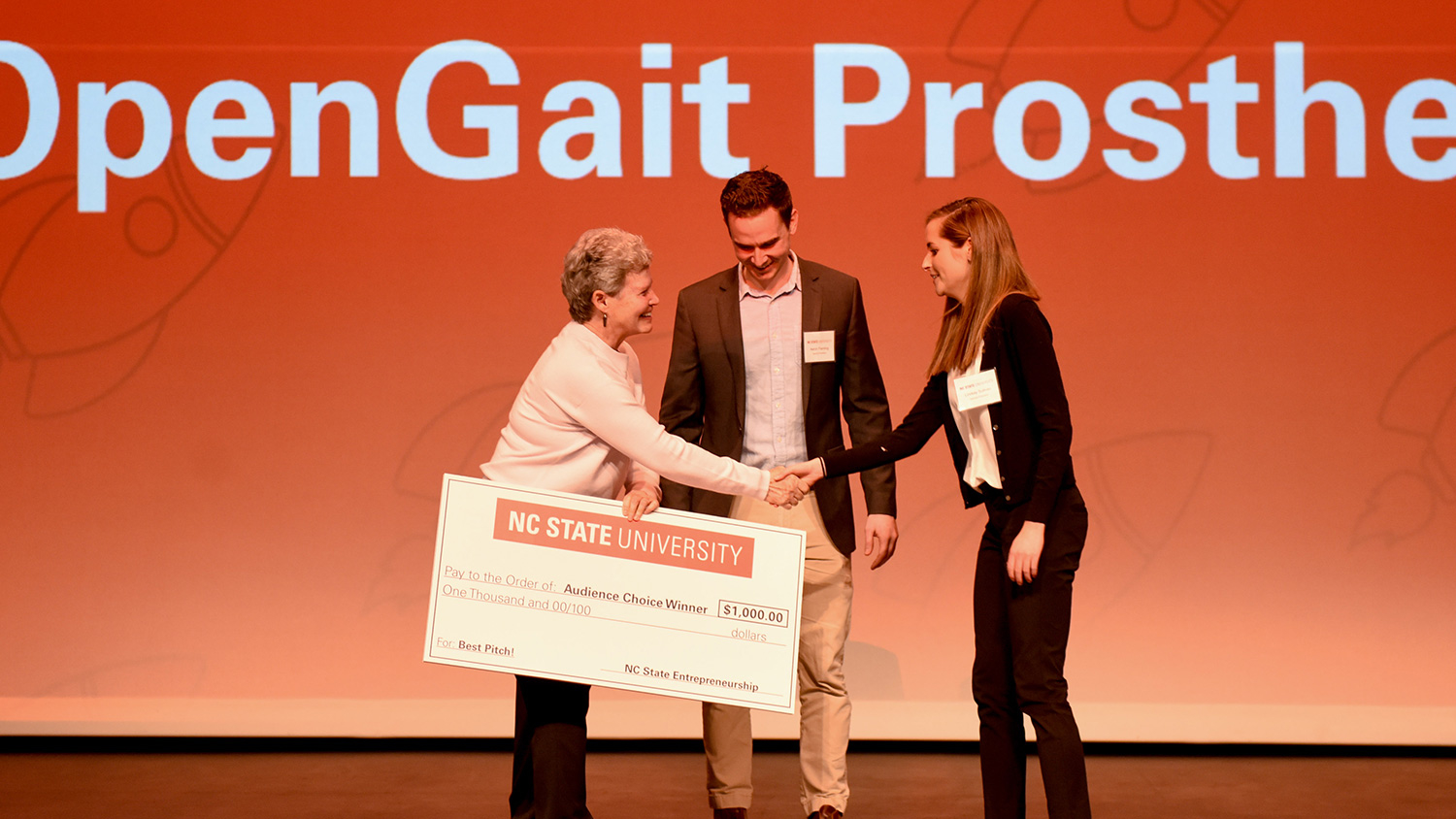Product Innovation Lab Team Incorporates OpenGait Prosthetics

For the past two years, three NC State graduate students have been developing a low-cost, effective solution for people living with above-knee amputations. On January 1, 2019, they incorporated their startup as OpenGait Prosthetics.
OpenGait’s founders – Aaron Fleming, Lindsay Sullivan and Dustin Prescott – are continuing work that began in fall 2017, when they were enrolled in the cross-disciplinary Product Innovation Lab (PIL) course, part of the NC State Jenkins MBA program’s Product Innovation Management concentration. The course has MBA, engineering and industrial design students working in teams to develop solutions to various problems presented to class, and to devise business plans around their solutions.
Fleming and Sullivan, doctoral students in the joint department of biomedical engineering at NC State University College of Engineering and the University of North Carolina at Chapel Hill, and Prescott, an NC State Jenkins MBA December 2017 graduate, were among several student teams working with the prosthetics project which began in fall 2017, and brought it to the startup stage at the start of 2019.
“There are approximately eight million above-knee amputees worldwide and only five percent have access to a quality prosthesis,” Fleming said.
The team’s project mentor, Brent Wright, an orthotics and prosthetics practitioner in Raleigh, N.C., and his wife Meredith co-founded the nonprofit LifeNabled, which serves amputees in Guatemala and locally, seeking to understand the full process of providing an above-knee prosthesis and the major pain points people face along the way.
The OpenGait team began with intellectual property initially developed by LifeNabled, “and took it to the next level,” Wright said.
“Through our involvement with PIL, we learned the basic principles of problem identification, customer discovery, market analysis, and design development,” Prescott said, knowledge that led the team to develop “a complete prosthetic kit for above-knee amputees that will unlock access to mobility and independence to so many in need.”
“We plan to continue working on this project as a company and aim to provide our prosthetic kits to amputees across the world,” he said, noting that the team continues to have support from the PIL course professors, including Tom Snyder with RiOT, Jonathan Bohlmann in Poole College; and Ola Harrysson and John Muth, College of Engineering.
“Recently, we have been building our network with global aid organizations to better understand their challenges, pain points and needs, to ensure we create a solution they can use,” Sullivan said.
The average cost of a full prosthetic leg can range from $5,000 to $70,000 without donated parts, he said. Also, each socket is custom molded and can take up to nine hours of labor by a trained prosthetist. Due to changes in the residual limb volume, an amputee will often need a new device in as little as one year.
The OpenGait team’s “continuous design, prototype iteration and amputee testing over the past year and a half has led to the prosthetic kit we have today,” Sullivan said.
“We are still in the development phase and making exciting changes based on recent amputee feedback,” she said. ”In the next few months, we plan to put together several kits for testing in Guatemala with LifeNabled.”
“In addition to our revolutionary socket system, OpenGait is working with other prosthetic component suppliers to develop a complete prosthetic kit, to include all components and tools required to fit an above knee amputee,” Fleming said. “This would allow a prosthetist to bring the solution to the patient,” he said, enabling “those who would help individuals lacking the resources to travel to clinics and remove the burden of the prosthetist to source parts and manage inventories.”
“We are really excited about the momentum we have developed with the project over recent months,” Prescott said. “The funding we have secured will allow us to progress further, taking us closer to developing a solution that will meet the needs of millions of amputees around the world. We are so fortunate to be working with a university and community who supports new entrepreneurs like us so well.”
“The progress and initiative of the OpenGait team reflect the type of high-impact innovation you can achieve in truly cross-disciplinary efforts. They’ve done great work,” said Jonathan Bohlmann, professor of marketing and innovation at Poole College.
The OpenGait team has earned several awards since it began: Stage 1 funding ($5,000) and stage 2 funding ($20,000) from VentureWells’ E-team program; second place in Poole College’s 2018 Leadership and Innovation Showcase ($3,000); and a 2019 Lulu eGames finalist in three categories: Design and Prototype, New Venture, Social and Environmental Impact ($19,000 total). They also participated in the NC State I-Corps program, receiving $3,000 for customer discovery and won a Women’s Net Amber Grant for $1,000.
This post was originally published in Poole College of Management News.


